Columbus, GA Pollen and Allergy Report for Summer 2023
Pollen Allergy Trends in Columbus, GA
When is pollen lowest in Columbus, GA?

September
Lowest month total PPM
Avg. PPM
When is pollen highest in Columbus, GA?

April
Highest month total PPM
Avg. PPM
How does pollen in Columbus, GA compare to Georgia?
Columbus has a higher average PPM than the state of Georgia.
Columbus yearly avg PPM:
Georgia yearly avg PPM:
How does pollen in Columbus, GA compare to the USA?
Columbus has a higher average PPM than the USA.
Columbus yearly avg PPM:
USA yearly avg PPM:
Is pollen worse this year in Columbus, GA?
Spring 2023 was better than spring 2022.
Spring 2023 PPM:
Spring 2022 PPM:
Average PPM in Columbus, GA
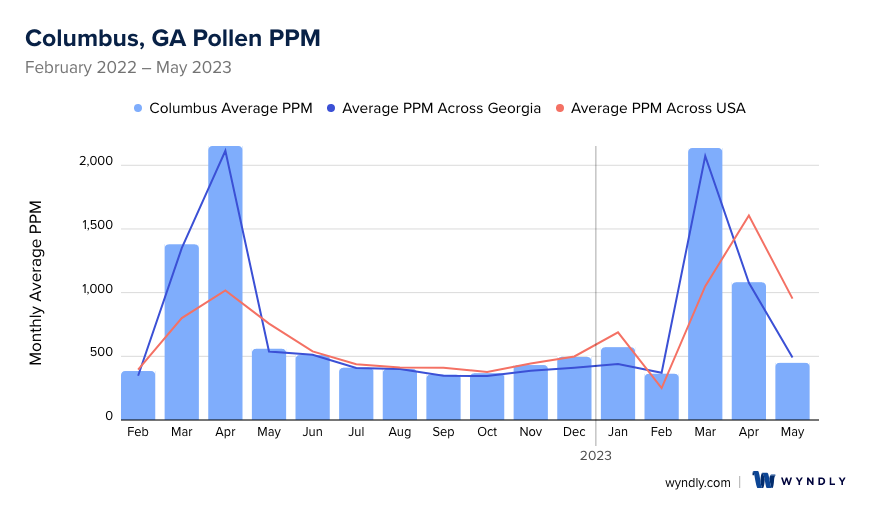
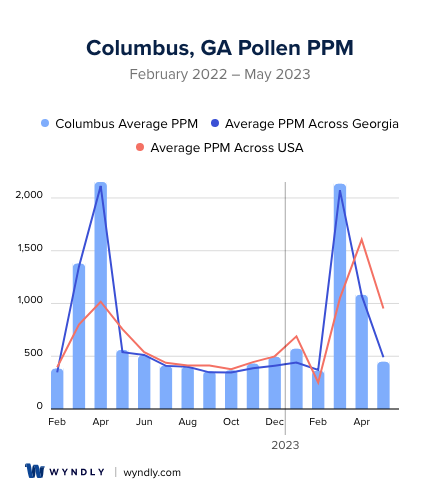
Columbus, GA Pollen and Allergy Breakdown by Month
Grass
When is grass pollen highest in Columbus, GA?
April has the highest grass pollen in Columbus, GA with an average PPM of
When is grass pollen lowest in Columbus, GA?
December has the lowest grass pollen in Columbus, GA with an average PPM of
Tree
When is tree pollen highest in Columbus, GA?
March has the highest tree pollen in Columbus, GA with an average PPM of
When is tree pollen lowest in Columbus, GA?
September has the lowest tree pollen in Columbus, GA with an average PPM of
Weed
When is weed pollen highest in Columbus, GA?
April has the highest weed pollen in Columbus, GA with an average PPM of
When is weed pollen lowest in Columbus, GA?
February has the lowest weed pollen in Columbus, GA with an average PPM of
Columbus, GA Pollen Monthly Breakdown by Pollen Type
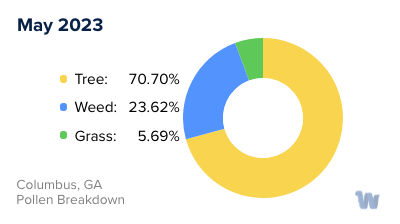
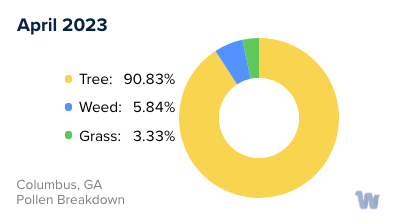
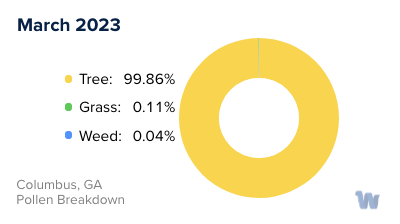
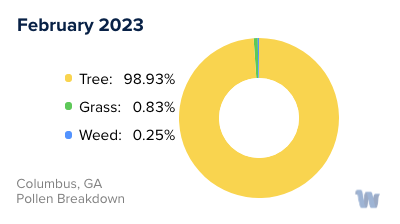
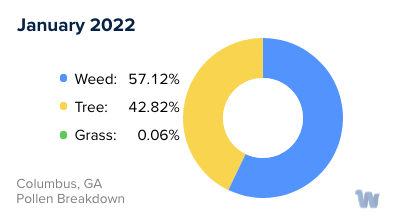
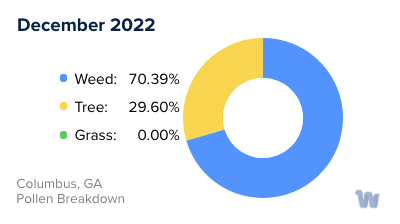
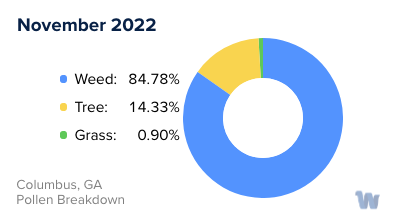
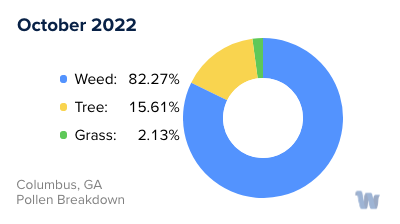

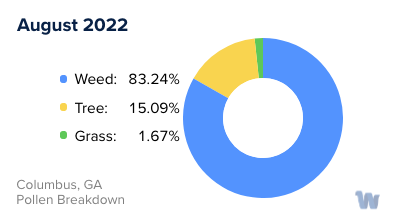
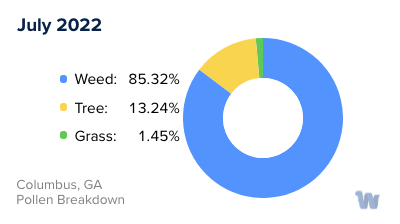
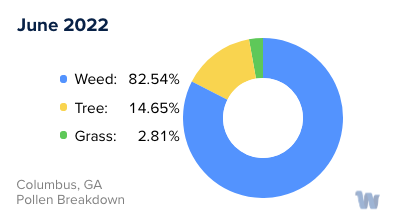
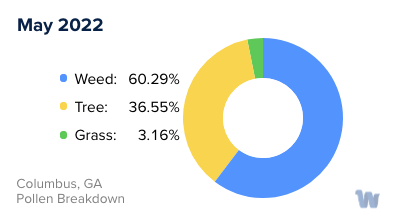
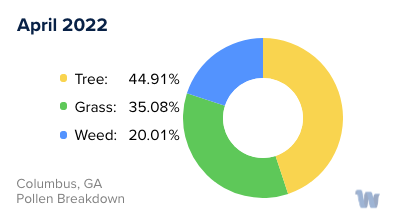
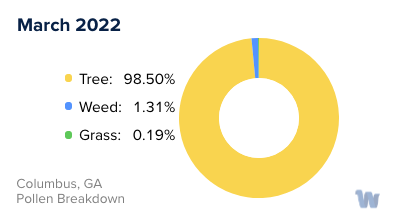
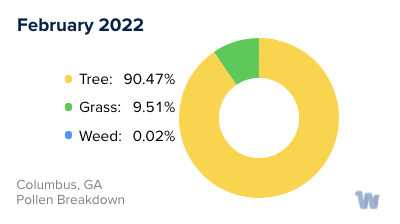
Pollen and Hay Fever in Columbus, GA
Pollen allergies, often referred to as hay fever, are a common ailment among residents of Columbus, Georgia, and understanding the environmental triggers can be a crucial part of managing the condition.
The primary types of pollen that affect the area stem from trees, grasses, and weeds, each peaking at different times throughout the year. The abundance and diversity of vegetation in Columbus create an environment where various pollen types are present nearly year-round.
Tree pollen tends to be the first to appear, typically surfacing in late winter to early spring. Oak, pine, and cedar trees are some of the predominant sources of tree pollen in the region. The grains, though microscopic, can travel on the breeze and find their way into our noses and throats, causing the familiar symptoms of sneezing, runny nose, and itchy eyes.
Following the tree pollen season, grass pollen takes the stage in late spring and early summer. Bermuda grass, Timothy grass, and Kentucky bluegrass are common culprits in Columbus. These grasses release their pollen into the air, contributing to the "pollen cloud" that can sometimes be seen on particularly high pollen days.
Weed pollen, with ragweed being the most notorious, rounds out the year in late summer and fall. In Columbus, the warm, humid climate often allows ragweed to bloom and release its pollen well into the autumn months, extending the allergy season for those sensitive to this type of pollen.
It's important to understand that while these pollen sources have peak seasons, weather conditions can cause variations. A mild winter might see trees pollinating earlier, or a rainy spring could suppress grass pollen levels. Consequently, the pollen count and the impact on those with allergies can fluctuate significantly throughout the year in Columbus, Georgia.
The ebb and flow of these different types of pollen, each with their own unique season, can make Columbus, Georgia, a challenging place for individuals with pollen allergies. But with knowledge and awareness, residents can better anticipate these pollen seasons and adjust their activities accordingly to minimize exposure.

